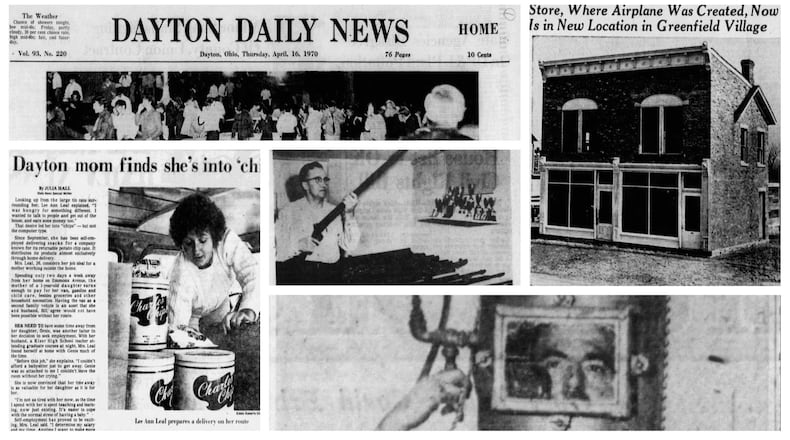Here’s a look at some stories happening the week of April 16-22.
April 16, 1937: Store, where airplane was created, now is in new location in Greenfield Village
The original bicycle shop of the Wright brothers was moved from 1127 W. Third St. to Greenfield Village in Dearborn, Mich., after it was bought by Henry Ford.
The house in which Orville Wright was born and in which he and Wilbur grew up, formerly at 7 Hawthorn St., was also moved to Michigan and was being reconstructed near the shop.
Wilbur Wright died in that house of typhoid fever on May 12, 1912. Wilbur was born April 16, 1867 on a farm new Newcastle, Ind., and soon afterwards the family moved to Dayton.
April 21, 1946: Goldbergish diving gadget works
Floyd Perkins enjoyed creating and building new gadgets. A worn-out hot water heater was serving as a fence post in his backyard. Perkins, tired of looking at it, decided to try to make it a diving helmet.
After two years of tinkering, he finished the helmet and offered it to the Navy. Several Navy officers told him to keep his invention a secret, but then he didn’t hear anything else from them.
The tank weighed 75 pounds. A 50-pound waist belt was also worn. With a 150-foot hose and air compressor, Perkins could submerge to a depth of 35 feet for as long as 40 minutes. The helmet was also equipped with a telephone which operated on a short wave transmitter. In muddy water, a flashlight in a glass jar was used for better vision.
He often volunteered to use the helmet in drowning situations, although he was never called upon. Instead, police prefer grappling hooks in searching for water victims. He said, “I feel that if I could save just one life, I would be well repaid for my time in building the outfit.”
Perkins notified the Montgomery County Sheriff that he would sell the helmet to the county or be available to operate it in emergencies.
April 17, 1960: Gun collector proud of old muzzle-loader
Oscar Seubert left his native Germany for Dayton in 1930 and began collecting guns in 1931.
As well as being a collector, Seubert was an expert marksman. He also was an avid hunter.
At the time the story was written, Seubert had 49 rifles, shotguns and pistols, some more than 100 years old. He was especially proud of a muzzle-loader that was fired by Annie Oakley.
Seubert was teaching his sons to shoot and care for guns. His first advice to them was, “Don’t point a gun at anything you don’t want to shoot.”
April 16, 1970: 150 arrested in Miami University riot
More than 150 Miami University students were arrested stemming from a sit-in at the Naval ROTC building.
A Butler County sheriff’s deputy termed it a “full-scale riot.” Seven hundred National Guardsmen were deployed near the normally peaceful campus before daybreak.
The disturbance included a six-hour occupation of Rowan Hall by about 300 students. The building was seized some time after a student rally as part of a university-sanctioned Vietnam war protest.
There were reports of students being struck by tear gas canisters, students being attacked by police dogs and bricks thrown through windshields of police cruisers. At least 40 tear gas canisters were fired.
More trouble developed later when about 150 students gathered at the police station to protest the arrests. Police dispersed them with tear gas.
April 18, 1980: Dayton mom finds she’s into ‘chips’
Lee Ann Leal became self-employed delivering Charles Chips in their returnable potato chip cans. The company distributed its products almost exclusively through home delivery.
Spending only two days a week away from her home, she earned enough to pay for her van, gasoline and child care, besides groceries and other household necessities.
Self-employment proved to be exciting, Leal said, “I determine my salary and my time. Anytime I want to make more money, I can if I hustle.”
Leal delivered to some 900 customers in north and downtown Dayton, Oakwood and Kettering.
April 20, 1988: Ali gives lesson in life’s knocks at CSU
Muhammad Ali and boxing promoter Don King were at Central State University as honored guests at CSU’s weekly convocation.
Ali had trouble talking and seemed stiff from Parkinson’s syndrome. King did the majority of the talking, and promised to donate $25,000 to the school. King was honored with a one-day diploma and an honorary doctor of humane letters.
“The Greatest” was asked about which fighter would be more difficult to deal with, George Foreman or Mike Tyson. Ali said, “Foreman was tall. He had reach. He hit you from a distance. Foreman had a long jab and a long right hand. Foreman could knock you out from distance. Tyson would be easier because you could stay off of him.”
About the Author







